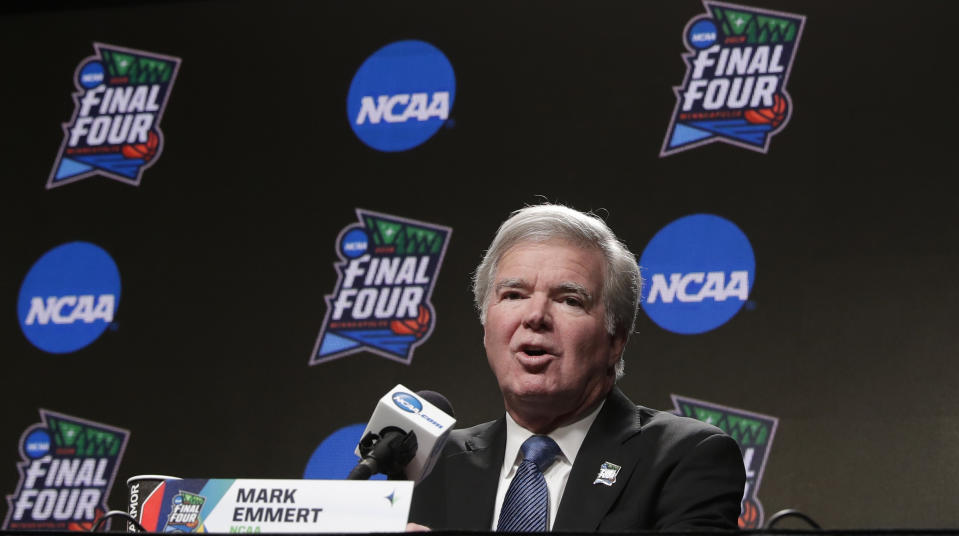California bill that would allow college athletes to be paid for their likeness closer to becoming law
A California bill that would allow student-athletes in the state to profit from the use of their own name, image and likeness took another step closer to coming to fruition earlier this week.
On Tuesday, California’s Committee on Higher Education voted 11-0 to pass the Fair Pay to Play Act, which would go into effect in Jan. 1, 2023, through to the state’s Assembly Appropriations Committee, according to the Palm Springs Desert Sun.
[Join or create a 2019 Yahoo College Fantasy Football league for free today]
NCAA strongly opposes bill
Though the NCAA formed a group to “examine issues related to student-athlete name, image and likeness” in May, it staunchly opposes this legislation, which previously passed through the state Senate by a 31-4 vote.
Last month, NCAA president Mark Emmert sent a letter to state lawmakers asking to delay consideration for the bill until NCAA officials discuss the issue. When the NCAA announced its “working group” on name, image and likeness issues, it said an update on the group’s efforts would be provided in August with a final report due to the NCAA Board of Governors in October.
In Emmert’s letter, he implied that universities in the state could be barred from NCAA championships if the bill is entered into state law and that it would “likely have a negative impact” on student-athletes. His letter also said the law would make it “impossible to host fair national championships” in California because the state’s universities would be violating NCAA bylaws.

State officials not backing down from NCAA ‘threats’
But state officials were not deterred by the NCAA’s pushback. Jose Medina, the chairman of the state assembly’s Committee on Higher Education, told ESPN that the NCAA’s response to the bill has been “akin to bullying.”
"I don't take too fondly to threats to the state of California regardless of where they come from," Medina told ESPN.
Emmert’s letter prompted a minor amendment to the bill in which the state acknowledged that it will “monitor” the findings of the NCAA working group. According to ESPN, Senator Nancy Skinner said Tuesday that the timeline for the bill to go into effect (2023) was also designed to allow the NCAA to potentially shift its position on the issue and make changes. Otherwise, the bill will continue to proceed with the next vote likely coming in August.
If the bill passes through the next state committee, it would next move through to the governor’s office to be signed into state law.
Bill would allow NCAA athletes to make endorsement deals
If the bill is indeed passed into state law, student-athletes in California would essentially have the same endorsement opportunities provided to Olympic athletes. Schools would not be paying its athletes, but the athletes would be able to hire an agent and pursue outside business deals without jeopardizing their eligibility. Student-athletes would also own the rights to the use of their names and images on college-related apparel.
“I ask you to imagine if any other billion-dollar industry relied on college students as their primary source of talent for the revenue of their industry yet denied those students compensation,” Skinner said at Tuesday’s hearing per the Desert Sun.
While officials from several universities across the state spoke in opposition to the bill, fearing unintended consequences, one advocate for the bill is Los Angeles Chargers offensive lineman Russell Okung.
Okung wrote about the issue in The Players’ Tribune, detailing his financial issues during his college football career at Oklahoma State:
“Being broke stung, particularly because I knew that my teammates and I had made others rich. During my days at OSU, I saw fans regularly pay thousands of dollars to fly out to Stillwater to attend games, while many of my teammates didn’t have enough money to fly home to see our families during school breaks. I watched our university lavish elite donors with high-end dinners, while some of my teammates were skipping meals due to lack of funds.”
The NCAA has long used its tax-exempt status and the concept of “amateurism” as a way to defend its rules that prohibit athletes from being compensated in any way, including via the use of their own likeness. The name, image, likeness issue came to the forefront of NCAA debate in 2009 when two former college athletes, including former UCLA basketball player Ed O’Bannon, sued the NCAA for the use of their likeness in video games.
More from Yahoo Sports:

 Yahoo Sports
Yahoo Sports 